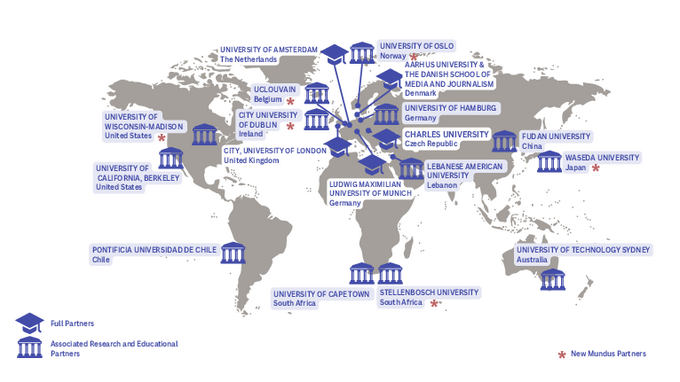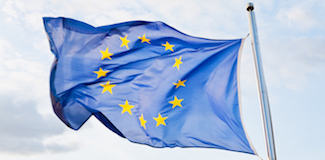The Mundus Journalism Consortium - a collaborative venture
Above: The Mundus Consortium standing outside of Charles University after a Board of Studies meeting held in Prague.
The Erasmus Mundus programme is built upon a rich history of collaborative research and teaching among European and non-European universities
In 2004, this collaboration reached a new level with the formation of a Consortium aimed at attaining Erasmus Mundus Consortium status from the EU, facilitating the offering of Erasmus Mundus master's degrees. Following a successful application, the Consortium was granted the Erasmus Mundus label and received Mundus funding in 2005.
Subsequently, in September 2005, the inaugural edition of Mundus Journalism, Media, and Globalisation welcomed 27 students from diverse backgrounds worldwide. Since then, our programme has experienced remarkable growth, with nearly 600 applicants per edition, allowing us to now accept approximately 90 outstanding students annually. This expansion has enriched our Mundus family, comprising nearly 1500 alumni spanning over 100 countries across the globe.
Like all other Erasmus Mundus Consortia, we must undergo periodic reapplication to the EU to sustain the programme. In July 2019, the Consortium received favorable updates from the EU Commission. Its latest application, bolstered by a revised program featuring robust global partners and a fortified curriculum intertwining academic and journalistic perspectives, stood out among 91 eligible applications, securing funding – and the Erasmus Mundus label - as one of the 44 selected projects.
Mundus Journalism 2024 and beyond: a revitalized program that places resilience at its core
As we endeavor to renew our Erasmus Mundus status in 2024, we find ourselves standing at a pivotal moment. Journalism remains indispensable yet under significant threat, particularly in an era where global security feels more precarious than it has in decades. Confronting these challenges demands not only the presence of robust journalism but also the safeguarding of democratic principles, the rule of law, and human rights within societal and political frameworks.
With this imperative in mind, we have crafted a revitalized program that places resilience at its core. Our revised learning objectives are designed to equip students with the skills needed to navigate a turbulent professional and societal landscape. To bolster our resilience perspective, we have instituted a specialised Resilience Task Force, involving students, faculty, and administrative staff to cultivate this emphasis across all levels and from various viewpoints.
We have expanded our network of Associated Partners, intensified our scrutiny of AI's impact on society and journalism, and continued to integrate students and alumni into our management and quality assurance frameworks. Additionally, the introduction of a new specialisation and joint degree in Crisis & Conflict at City, University of London underscores our commitment to this renewed focus.
As shown on the map below, the Mundus Journalism Consortium is meticulously developed by selecting premier Degree Awarding Partners and Associated Research and Educational Partners. Together with our Associated Professional Partners, they deliver a cutting-edge Master’s programme focused on cultivating analytical and critical perspectives on journalism, media, and globalisation.

